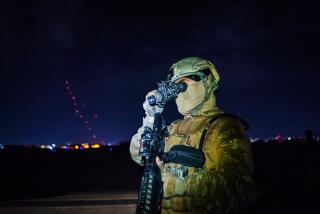The President’s Thorny Olive Branch
There has been much talk in recent weeks about President Bush’s apparent determination to change course in Iraq. Exhibit One is his decision, reiterated in Tuesday’s speech to the United Nations, to seek a new U.N. resolution encouraging other countries to contribute troops and money to the Iraq reconstruction effort. The White House, it appears, has finally recognized that it cannot succeed on its own in Iraq.
But a closer analysis of Bush’s argument to the U.N. General Assembly suggests that there is less here than meets the eye, and that any policy changes he might be making are purely about tactics and not about strategy.
The speech was vintage Bush -- clear, concise, hard-charging, with not an inch of give to his critics. Everyone has to make a choice, he said, and those that make a wrong choice (as did the regimes in Afghanistan and Iraq) must suffer the consequences. He admitted no mistakes in postwar planning and defended the U.S. decision to take the fight against terrorism “to the enemy.”
“The deadly combination of outlaw regimes and terror networks and weapons of mass murder is a peril that cannot be ignored or wished away,” Bush said.
The problem is, the president’s worldview leaves little room for allies or international institutions that do not bend to Washington’s ways.
Sure, Bush asked foreign capitals to put aside past differences and join the effort to create a democratic Iraq. But he did not plead for their help or offer them a say in deciding Iraq policy.
He insisted that the process of devolving authority to Iraqis would be neither hurried nor delayed. And although he called for greater U.N. involvement in rebuilding Iraq, he limited its role to helping Iraq write a new constitution, train civil servants and conduct elections. For everything else -- including security and masterminding the return of power to Iraqis -- “the coalition” (read: the U.S.) would remain in control.
This is the essence of the foreign policy revolution that Bush has pursued since coming to office: An America unbound by others is a more secure America. He’s willing to ask here and there for the blessing of the international community -- as he did before the war and again Tuesday -- but with it or without, he will act as he sees fit.
Bush may get his new resolution, but few countries are likely to fork over billions of dollars and risk the lives of their sons and daughters -- not to mention their own political fortunes -- without getting a significant say in how troops are to be deployed and the money is to be spent.
So Bush soon may have to make the toughest decision of his presidency. He can stay faithful to the course he set long ago and do it on his own terms in Iraq -- with all the risks and costs that entails both at home and abroad. Or he can swallow hard, change course and seek a true partnership with others to secure their involvement in the effort.
More to Read
Get the L.A. Times Politics newsletter
Deeply reported insights into legislation, politics and policy from Sacramento, Washington and beyond. In your inbox three times per week.
You may occasionally receive promotional content from the Los Angeles Times.










